#fiction writing
Note
Hello this is a question that came about from watching the new Fallout TV show and a character named Maximus. He’s a relatively neutral character and his arc is very wonderful coming from a writer and big book reader but I noticed that the average viewer doesn’t understand his character and actually hates him… my question is as an author is it okay to make your story more digestible to people who lack perception since it’s the general audience for mainstream media and how do you do that without losing your story? Idk this was probably too complex and a stupid question 💔
Not a stupid question! There are no stupid questions.
Going to unpack this a bit though. (I haven't seen the show.) First some general points, but then some advice on balancing complexity in a story.
So. Some things to get out of the way:
You don't know what the average viewer is thinking. Just because their opinion on a character is different to yours, doesn't mean they lack perception. Do we sometimes have an issue with critical thinking in the modern age? Yes. But we also live in an age where people bring a vast array of different insights and experiences into the stories they read/watch. 99% of the time a story doesn't have just one right interpretation, especially if it is a more complex narrative.
You CAN try to write a story that is more digestible to a general audience, but if you do have concerns about the media literacy of the general population, focusing on providing unchallenging stories is not the fix to that. People learn through engaging with interesting work and having discussions about them - e.g. when they are given the opportunity to. Perception, like anything, is a skill trained with practice. No one's born with it. There's no inherent us/them that can't be changed.
Will you be happy and fulfilled as a writer writing stories that you feel are dumbed or watered down? I know I wouldn't end up writing the versions of stories that I want. Similarly, you probably won't then attract the readers/audience that most resonate with your ideas, because you don't give them the chance.
Generally speaking, people hate being talked down to. As a reader/lover of stories, if I thought a writer was talking down to me and thought I was an idiot who couldn't understand the themes/plot, I wouldn't want to have anything to do with their stuff. It's a horrible feeling, isn't it? It's like being written off before you even leave the gate.
Okay, now some advice:
Amazing children's books are a great example of stories that are simplified to appeal and meet the audience where they are at, without losing the richness that makes them resonate and engage readers/audience. However, there are adult examples too. They share some qualities.
These often have:
Clear structure (there are a myriad story structures that you can use to make a story hit beats the reader expects and create a sense of satisfaction, while still giving you room to play.)
High concept story idea/plot (so, stories that can be explained/pitched in a line. E.g. children are forced to fight in televised death matches (Hunger Games), a famous author is imprisoned by a dangerous fan who doesn't approve of his new work (Misery), 'it's jaws in outer space!'). These stories have simple premises that often have wide-appeal, but the stories themselves can be complex.
Engaging main character(s) with a clear goal/agenda. They don't have to all be morally pure, but for an easy win, your character should be likeable/easy to root for. In a children's book, e.g. at the simplest level, these are often also high concept. (E.g. a mouse wants to be heard so is convinced it needs a lion's roar to be loved - The Lion Inside by Rachel Bright)
There are, of course, exceptions to every rule. Game of Thrones was phenomenally popular, for example, but I don't think it's an easy to sink into world/simple set of characters.
Watering down an existing story to fit a different target audience is often not going to lead you to write the best story. This is because it's like trying to fit a triangle into a circle, or make a banana bread into a savoury scone. However, there are plenty of stories with mass-appeal that offer readers a variety of different levels to engage with them, so it is very possible to write a brilliant story with mass appeal. But you work from the foundations up, not from the finished product down.
I hope this helps!
49 notes
·
View notes
Text
TCOT Release Date GOAL
This is not a confirmed Release Date, but a Goal.
I hope to Finish TCOT by March of Next Year.
This is my Goal, and I really hope with all the free time I'll have this summer, that I can do it.
I want all of you to know I love you, and I'm writing this story for you <3
I hope you can stand to wait for it a little longer :]
Thank you for being here and Being excited for my stupid little stories. I hope you'll all like it when its done.
(No one has said they want to be taken off the tag list... so tell me if you do) Or if you want to be added to the list Tell me as well,
@oliolioxenfreewrites @friendfromdsmp @thepeculiarbird @corinneglass @phoenixradiant @sunflowerrosy @kia-is-poisoned @rivenantiqnerd @aestheic-writer18 @ryahisbored @nkikio @somethingclevermahogony @mjparkerwriting @sl-vega @darkandstormydolls @agirlandherquill @baconandeggs-25 @alnaperera @fantasy-things-and-such @ajgrey9647 @aalinaaaaaa @cybercelestian @danielleitloudernow @illarian-rambling @idunnobutliaiscool @jeremy-no @vyuntspakhkite-l-darling @fandom-pits-dweller @xenascribbles @katwritesshit @smudged-red-ink @sunnyjustice @thelazywitchphotographer @pastellbg @louudthoughts @bigwipscholar @killingthemoon84 @fenatics @attemptingwriter @purplehandshumanfeelings @bluberimufim
#creative writing#fiction writing#writing community#writer things#writerscommunity#writers on tumblr#writeblr#writing#writers#writer#the c#the cursed one's throne#ellia's ramblings#ellia's TCOT#ellia TCOT#novel#writing a novel#novel writing#fiction#author#readers#indie author#boo#writing a book#books#book#books and reading#booklr#book blog#bookblr
39 notes
·
View notes
Text
"Why did you do this?"
"What do you mean?"
"This." He gestures at the carnage in front of them. "This. The only thing these people have done is threaten my clan."
Anger swirls in her like a burst of colors, and she spins on her heel to look at him with narrowed eyes.
"Why? Because you're mine. Mine, you hear?" Her bloodstained lips part into a snarl. "And no one, absolutely no one, hurts what's mine."
-ahopelessromantika-
#writing community#writeblr#writing#writing ideas#writers on tumblr#writing prompt#writing prompts#fiction#dialogue prompt#dialouge prompts#character dialogue#fiction writing#writers society#writers of tumblr#female writers#writerscorner#writerscommunity#writing inspo#writing inspiration#story prompt#story prompts#romance prompts#dark romance#fiction prompts
25 notes
·
View notes
Text
A new burrow.
[Note: psssttt @nobodys-reblogs come get your BIB fuelll!]
"...What is that?" Horror pointed to the bunnies—Very round ones at that, snuggled warmly in Killer's jacket, as he gave the widest smile.
"Rabbits!" He exclaimed, bouncing on his heels as Dust lit up his third cigarette today, he did not have the sheer mental compatibility that was required to deal with Killer's energy.
"...Not food?" Horror followed up with as he tilted his head, and Killer shook his skull. "Nope! Not food! They look like us!" He handed Horror the bunny missing an ear, as he glanced down hungrily at it.
Then he placed Dust's bunny on top of the hooded skeleton's head... because of course he did.
"We're not keeping them." The smoker spoke with a gruff voice, and Killer pouted, his heart shaped soul seemed to dim a bit.
"Uh, yeah we are?" Killer said as his bunny was chewing on his hoodie's strings, little tail wagging as it's eye.. goop? Was getting everywhere.
Horror looked at Dust, then back at his bunny—Which was the largest of the three. "...They ain't gonna hurt anyone."
"Fuckin'..." The Dust bunny flopped it's ears over Dusts face, getting a groan from him. "...I hate you."
"I know!~" Killer spun the rabbit around. "I'm gonna go set up an enclosure for him!" He decided as he hopped, teleporting to who knows where.
"...Don't." Dust hissed out as Horror went to nibble on his rabbits ear, the rabbit in question was chewing on his arm.
After deciding he didn't want to watch Horror eat... well other Horror (are these.. from AUs of their own?) He left the two.
The Dust bunny continued to demand his attention, now pawing at his forehead as he tried to ignore it, walking towards the kitchen.
"Stop.. pawing me..." He grumbled, as it's paw hesitated, before bapping him again. He sighed.
"Goddammit..."
<><><><><><><><><><><><><><><><><><><><><>
BIBmare was royally freaked out. His henchmen were gone! He thought they'd retreat, but nooooo! Those... morons! They're gone!
He thumped throughout the carrot castle, one built off carrots and dirt, a burrow fit for king! As he was calling out of his bunnies as he saw BIB Cross, who was eating one of his decorative plants.

"You!" He hopped forward, "Where are the others!? They haven't returned!"
BIB cross made a nibble noise.
"...Yes, I'm aware they aren't in the castle, that is an issue!" All six of his ears flopped up and down in a panicked motion.
Another squeak from BIB Cross.
"For stars—Go look for them!" He demanded. Momentarily, BIB cross paused... before eating the dry wall instead.
"OH MY GOD!" BIBmare exclaimed. "You idiot! That is not—" He paused, hopping over and nibbling on it too.
Okay- it was pretty good.
<><><><><><><><><><><><><><><><><><><><><>
Okay so his Bunny has now eaten a hole in his jacket, which mildly ticked him off...But, then he remembered that, the guy probably hasn't eaten anything food related in awhile. So, snack time! Plus, he wanted to see how much damage the others rabbits had caused.
"Oh Dusty!~" Killer said in a sing song voice, pausing as he got to the kitchen.
Dust, had made a sort of... Nest? He was sleeping sitting up, wrapped in a few old blankets. While Dust bunny rested in his lap, tail wagging ever so slightly. Next to him, Horror and his rabbit were curled up, along with bits of carrots and various other vegetables scattered on the floor.
Killer smirked, his own bunny still being carried within his jacket. He walked and got into the frigde, pulling out a carrot that he let his—Who he's deemed Killey devour it.
After he was done with his little snack, his small paws kicked ever so slightly, making a whine as he wanted down.
"Awe, you even fight me me!" Killer said as he just, let go- the BIB bounced three times, until it landed on the other side of the pile. He shrugged, walking over and plopping down right next to him, letting his round friend climb atop his chest, like a weighted blanket.
Yeah, this was pretty nice.
Oh, and he's sooooo using this to blackmail Dust later, with his bunny hating bullshit.
But for now, he wanna snuggle.
#Bib#biblically inaccurate bunny#killer sans#dust sans#horror sans#nightmare sans#BIBs#Bunnies#fiction writing#writing#my fic#fanfic#Fluff#Lots of fluff#This is the most fluff I've ever written
20 notes
·
View notes
Text
Nine people to get to know
Thank you @ivaspinoza and @mysteryofvampires for tagging me!
Last Song -> Insane by Black Gryph0n
Favorite Colors -> Blue, Black, Purple, Pink, and White
Currently Watching? -> Acceleracers
Sweet/Savory/Spicy -> Savory
Current Obsession -> My WIP
Last thing I googled? -> Ignominious
Favorite Season -> Winter
Skills I'd like to learn -> Social ones
Best advice I've ever gotten -> You are not immune to propaganda.
Tagging @chauceryfairytales @the-ellia-west @donnerstag12 @kkcooper @mikathewriter
#writers#writers on tumblr#writeblr#writing#creative writing#writerscommunity#writing inspiration#aspiring writer#fiction writing#on writing#writer#tumblr writing community#writers and poets#writer community#original writing#about me
18 notes
·
View notes
Text
Pirate Terms and Phrases
-> Pirate Lingo
-> A Pirate's Glossary
Batten Down The Hatches - tie everything down and put stuff away for a coming storm.
Brig - a prison on a ship.
Bring a Spring Upon 'er - turn the ship in a different direction
Broadside - the most vulnerable angle of a ship that runs the length of the boat.
Cutlass - a thick, heavy and rather short sword blade.
Dance with Jack Ketch - to hang; death at the hands of the law (Jack Ketch was a famed English executioner).
Davy Jones's Locker - a mythical place at the bottom of the ocean where drowned sailors are said to go.
Dead Men Tell No Tales - the reason given for leaving no survivors.
Flogging - severe beating of a person.
Gangplank - removable ramp between the pier and ship.
Give No Quarter - show no mercy.
Jack - flag flown at the front of the ship to show nationality.
Jolly Roger - black pirate flag with a white skull and crossbones.
Keelhaul - a punishment where someone is dragged under the ship. They are cut by the planks and barnacles on the bottom of the ship.
Landlubber - an inexperienced or clumsy person who doesn't have any sailing skills.
Letters of Marque - government-issued letters allowing privateers the right to piracy of another ship during wartime.
Man-O-War - a pirate ship that is decked out and prepared for battle.
Maroon - to leave someone stranded on a. deserted island with no supplies, typically a punishment for any crew members who disrespected the captain.
Mutiny - a situation in which the crew chooses a new captain, sometimes by forcibly removing the old one.
No Prey, No Pay - a common pirate law that meant crew members were not paid, but rather received a share of whatever loot was taken.
Old Salt - experienced pirate or sailor.
Pillage - to steal/rob a place using violence.
Powder Monkeys - men that performed the most dangerous work on the ship. They were treated harshly, rarely paid, and were expendable.
Privateer - government-appointed pirates.
Run A Shot Across the Bow - fire a warning shot at another boat's Captain.
Scurvy - a disease caused by Vitamin C Deficiency.
Sea Legs - when a sailor adjusts his balance from riding on a boat for a long time.
Strike Colors - lower a ship's flag to indicate surrender.
Weigh Anchor and Hoist the Mizzen - an order to the crew to pull up the anchor and get the ship sailing.
If you like what I do and want to support me, please consider buying me a coffee! I also offer editing services and other writing advice on my Ko-fi! Become a member to receive exclusive content, early access, and prioritized writing prompt requests.
#creative writing#writeblr#pirate writing prompts#pirates#pirate au#glossary#pirate lingo#pirate terms and phrases#pirate language#pirate vocab#pirate vocabulary#victorian slang#how to talk like a pirate#how to write#writing tips#fiction writing#writing advice#writing help#writing resources
12K notes
·
View notes
Text
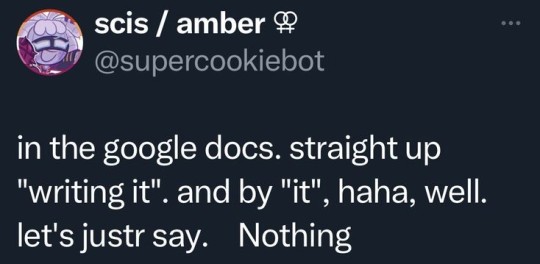
#fanfiction#writeblr#writer#writers#writing#writerscommunity#writblr#writer problems#writings#my writing#wip#write#being a writer#creative writing#female writers#fiction writing#just writer things#novel writing#writer life#writer meme#writer memes#writer struggles#writer stuff#writer things#writerblr#writers block#writers community#writers life#writers of tumblr#writers on tumblr
20K notes
·
View notes
Text
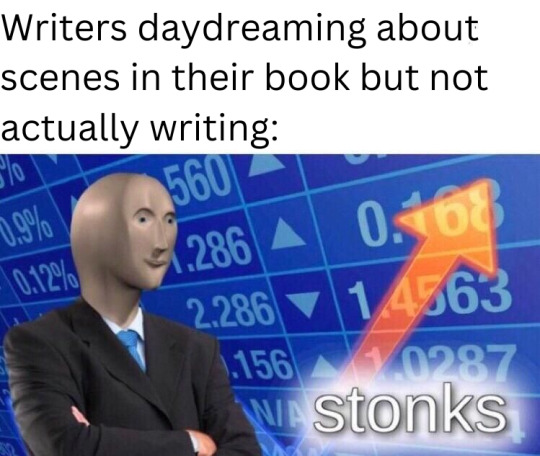
#it me#hmmm daydreaming go brrr#writing#fiction#creative writing#author#writerblr#writing community#my writing#writer#writers of tumblr#indie author#writing memes#novel writing#am writing#fantasy writing#book writing#fiction writing#story writing#writing blog#writing fiction#writing inspiration#writing meme
10K notes
·
View notes
Text
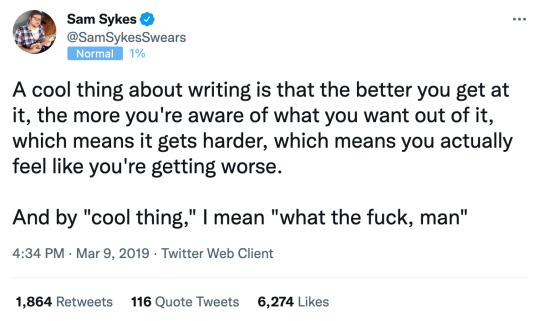
A cool thing about writing is that the better you get at it, the more you're aware of what you want out of it, which means it gets harder, which means you actually feel like you're getting worse.
And by "cool thing," I mean "what the fuck, man"
– Sam Sykes
#fiction#fiction writing#writing motivation#the writer life#sam sykes#tweet tweet#kcawf original#image description in alt text#writeblr
6K notes
·
View notes
Text
The Feral Writer lol
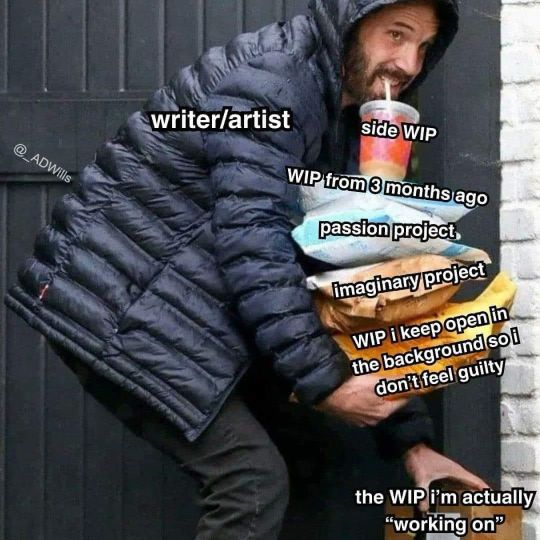
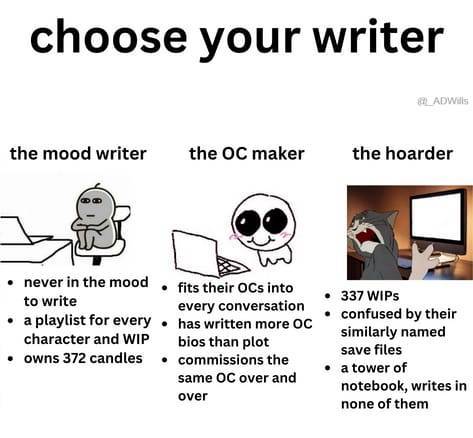
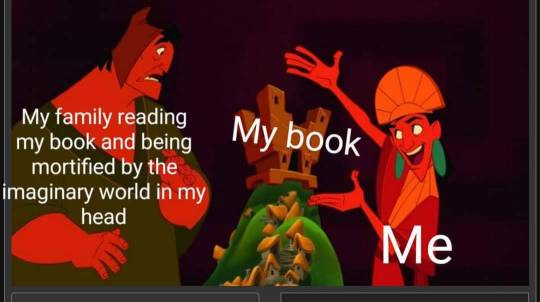

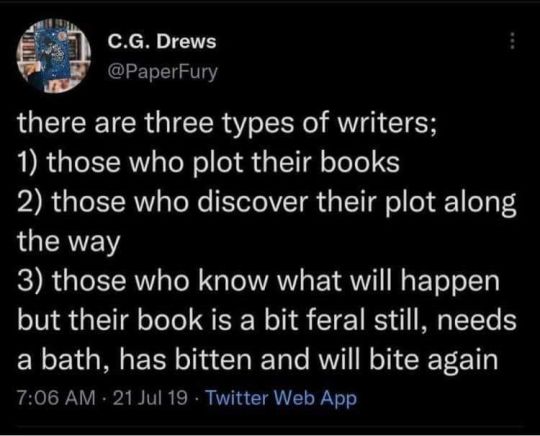

Writers Corner
#Writeblr#Writing community#Writing humor#Writers corner#Writers life#Writers#Writerscommunity#Writing#Writer#Creative writing#Fiction writing#Female writers#Tumblr writers
7K notes
·
View notes
Text
10 Tips for Crafting Authentic Characters
Give them depth: Create characters with multidimensional personalities, including strengths, weaknesses, quirks, and flaws. They should have a mix of virtues and vices that make them relatable and interesting.
Provide backstory: Develop a detailed backstory for each character, even if only a fraction of it makes it into your story. Understanding a character's past experiences, traumas, and motivations will inform their actions and decisions in the present.
Show their emotions: Allow your characters to express a range of emotions realistically. Show how they react to different situations, both internally and externally, to make them feel human and relatable.
Give them distinct voices: Each character should have a unique way of speaking, with distinct vocabulary, syntax, and speech patterns. This helps readers differentiate between characters and adds authenticity to their dialogue.
Create internal conflicts: Give your characters inner struggles and conflicting desires that they must grapple with throughout the story. Internal conflicts add depth and complexity to characters, making them more believable.
Show their relationships: Develop meaningful relationships between characters, whether they're familial, romantic, platonic, or adversarial. Show how these relationships evolve and influence the characters' development over time.
Make them evolve: Characters should grow and change over the course of the story, driven by their experiences and the challenges they face. Allow them to learn from their mistakes, overcome obstacles, and develop as individuals.
Ground them in reality: Anchor your characters in the real world by giving them relatable experiences, hobbies, jobs, or cultural backgrounds. Incorporating realistic details adds depth and authenticity to their portrayal.
Show their flaws: Imperfect characters are often the most compelling. Don't be afraid to showcase your characters' flaws and vulnerabilities; these imperfections make them more relatable and human.
Give them agency: Allow your characters to drive the plot forward through their actions, decisions, and choices. Avoid making them passive observers or mere vehicles for the story's events. Characters with agency feel more authentic and engaging to readers.
#writing tips#writing advice#writers on tumblr#writeblr#creative writing#fiction writing#writerscommunity#writing#writing help#writing resources
4K notes
·
View notes
Text
Writing rule:
Every character who speaks gets their own paragraph. If two characters are talking, each time they switch you must create a new paragraph.
Do not add more than one characters’s dialogue into a single paragraph or it will be too confusing for the reader.
#writing advice#writing tips#author advice#author tips#writing#writeblr#authors#books#writblr#author#aspiring writer#fiction writing#novel writing#creative writing#authors supporting authors#author blog#writing blog#stories#writerscorner#writing help#writing rules#wattpad author#ao3#wattpad#ao3 writer#wattpad writer#writer blog
5K notes
·
View notes
Text
I want someone to make those kinds of posts that people make about Hunger games about my book, analyzing it in-depth and all the connecting pieces I didn't know I connected.
#creative writing#fiction writing#writing community#writer things#writerscommunity#writers on tumblr#writeblr#writing#writers#writer#writ#writers and poets#writer community#female writers#writb#writbelr#writblr#writblur#writbr#writeb#writebrl#writeblogging
24 notes
·
View notes
Text
Weird Brain Hacks That Help Me Write
I'm a consistently inconsistent writer/aspiring novelist, member of the burnt-out-gifted-kid-to-adult-ADHD-diagnosis-pipeline, recently unemployed overachiever, and person who's sick of hearing the conventional neurotypical advice to dealing with writer's block (i.e. "write every single day," or "there's no such thing as writer's block- if you're struggling to write, just write" Like F*CK THAT. Thank you, Brenda, why don't you go and tell someone with diabetes to just start producing more insulin?)
I've yet to get to a point in my life where I'm able to consistently write at the pace I want to, but I've come a long way from where I was a few years ago. In the past five years I've written two drafts of a 130,000 word fantasy novel (currently working on the third) and I'm about 50,000 words in on the sequel. I've hit a bit of a snag recently, but now that I've suddenly got a lot of time on my hands, I'm hoping to revamp things and return to the basics that have gotten me to this point and I thought I might share.
1) My first draft stays between me and God
I find that I and a lot of other writers unfortunately have gotten it into our heads that first drafts are supposed to resemble the finished product and that revisions are only for fixing minor mistakes. Therefore, if our first draft sucks that must mean we suck as writers and having to rewrite things from scratch means that means our first draft is a failure.
I'm here to say that is one of the most detrimental mentalities you can have as a writer.
Ever try drawing a circle? You know how when you try to free-hand draw a perfect circle in one go, it never turns out right? Whereas if you scribble, say, ten circles on top of one another really quickly and then erase the messy lines until it looks like you drew a circle with a singular line, it ends up looking pretty decent?
Yeah. That's what the drafting process is.
Your first draft is supposed to suck. I don't care who you are, but you're never going to write a perfect first draft, especially if you're inexperienced. The purpose of the first draft is to lay down a semi-workable foundation. A really loose, messy sketch if you will. Get it all down on paper, even if it turns out to be the most cliche, cringe-inducing writing you've ever done. You can work out those kinks in the later drafts. The hardest part of the first draft is the most crucial part: getting started. Don't stress yourself out and make it even harder than it already is.
If that means making a promise to yourself that no one other than you will ever read your first draft unless it's over your cold, dead body, so be it.
2) Tell perfectionism to screw off by writing with a pen
I used to exclusively write with pencil until I realized I was spending more time erasing instead of writing.
Writing with a pen keeps me from editing while I right. Like, sometimes I'll have to cross something out or make notes in the margins, but unlike erasing and rewriting, this leaves the page looking like a disaster zone and that's a good thing.
If my writing looks like a complete mess on paper, that helps me move past the perfectionist paralysis and just focus on getting words down on the page. Somehow seeing a page full of chicken scratch makes me less worried about making my writing all perfect and pretty- and that helps me get on with my main goal of fleshing out ideas and getting words on a page.
3) It's okay to leave things blank when you can't think of the right word
My writing, especially my first draft, is often filled with ___ and .... and (insert name here) and red text that reads like stage directions because I can't think of what is supposed to go there or the correct way to write it.
I found it helps to treat my writing like I do multiple choice tests. Can't think of the right answer? Just skip it. Circle it, come back to it later, but don't let one tricky question stall you to the point where you run out of brain power or run out of time to answer the other questions.
If I'm on a role, I'm not gonna waste it by trying to remember that exact word that I need or figure out the right transition into the next scene or paragraph. I'm just going to leave it blank, mark to myself that I'll need to fix the problem later, and move on.
Trust me. This helps me sooooo much with staying on a roll.
4) Write Out of Order
This may not be for everyone, but it works wonders for me.
Sure, the story your writing may need to progress chronologically, but does that mean you need to write it chronologically? No. It just needs to be written.
I generally don't do this as much for editing, but for writing, so long as you're making progress, it doesn't matter if it's in the right order. Can't think of how to structure Chapter 2, but you have a pretty good idea of how your story's going to end? Write the ending then. You'll have to go back and write Chapter 2 eventually, but if you're feeling more motivated to write a completely different part of the book, who's to say you can't do that?
When I'm working on a project, I start off with a single document that I title "Scrap for (Project Title)" and then just write whatever comes to mind, in whatever order. Once I've gotten enough to work with, then I start outlining my plot and predicting how many chapters I'm going to need. Then, I create separate google docs for each individual chapter and work on them in whatever order I feel like, often leaving several partially complete as I jump from one to the other. Then, as each one gets finished, I copy and paste the chapter into the full manuscript document. This means that the official "draft" could have Chapters 1 and 9, but completely be missing Chapters 2-8, and that's fine. It's not like anyone will ever know once I finish it.
Sorry for the absurdly long post. Hopes this helps someone. Maybe I'll share more tricks in the future.
#writing#creative writing#writerscommunity#writers on tumblr#writing tips#writing advice#writers block#novel writing#fiction writing#writer#writers of tumblr
3K notes
·
View notes
Text
being a writer is spelling disembowelment correctly on the first try but somehow always screwing up definitliely
#writeblr#writer problems#creative writing#writing#writer#fiction#fiction writing#write#writers#writers on tumblr#writer life#spelling#speling misteaks#that last tag pained me to type#but seriously#we're writers why can't we spell#writing words is literally our whole thing#writing struggle#writing stuff#shitpost#writer vibes#too many tags#writer's problems#writer's life#writer's block#writer's thoughts#writerscommunity#writers and poets
2K notes
·
View notes
Text
the toughest part about writing isn't getting words on the page. the toughest part about writing is ignoring the voice in my head that says,
"hey man— sorry to interrupt, but that last sentence? it could use a few more emdashes. maybe just— and i know this seems nuts— ten or fifteen?? thanks— great stuff btw."
#writeblr#writers#creative writing#original writing#writeblr community#jgmartin#writing#writers of tumblr#writerscommunity#tumblr writers#writer problems#am writing#fiction writing#novel writing#writblr#writer community#writer things#writers and poets#writers on tumblr#writerslife#writing advice#text post#writing blog
3K notes
·
View notes